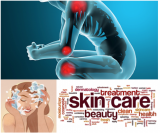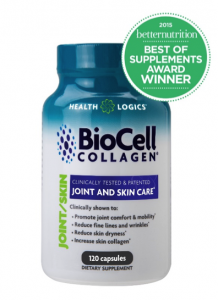
Collagen: What is it?
As the most abundant protein in the human body, collagen is one of the major building blocks of bones, skin, muscles, tendons, and ligaments. It also functions as a cushion for your joints, a support system for your muscles, organs and arteries, and an elasticity enhancer for your skin (1).
As we age, the amount of available collagen decreases, causing dryness between cells leading to wrinkles, cellulite and even joint pain. Approximately 4,000 people each year undergo cosmetic surgery to inject collagen into their skin to remove wrinkles, creases, and folds. However, the effects are often short-lived (2). Fear not! Sources of collagen can be found in foods, protein powders, dietary supplements, skincare products, and more.
Forever Young Skin
Believe it or not, your skin is the largest organ on your body and weighs about 6 pounds. As you go through life, your skin—amongst other things—is constantly changing. Aging skin involves physiological changes in the underlying tissues and often cause dryness, laxity, and wrinkles. With that being said, it is imperative to take care of your skin, and one such way is through collagen supplementation.
A 2012 pilot study investigated the effects of BioCell Collagen supplementation on reducing visible aging signs in the face (3). After 12 weeks of daily supplementation, participants experienced a reduction in skin dryness and wrinkles, and after 6 weeks, participants experienced a significant increase in the content of hemoglobin and collagen in the skin dermis. Elevated amounts of hemoglobin imply that blood circulation in the skin improved—allowing blood to easily carry oxygen, nutrients, and growth factors to the tissue while removing metabolic wastes.
This study suggests that dietary supplementation with BioCell Collagen elicits several physiological events which can be utilized to counteract natural aging processes to reduce visible aging signs in the human face. However, a controlled study is warranted to verify these observations (3).
Exercise Recovery
Muscle soreness seems to be inevitable after intensive resistance training. The use of mechanical stressors that overload your skeletal muscle result in muscular damage which is known to limit performance in repetitive activities due to a decreased range of motion, decreased force production, and pain (4).
However, such damage paradoxically promotes muscular adaptation to mechanical loading and physical activity. In other words, although you may initially feel sore, your body adapts and eventually provides protection against future injury (4).
Collagen supplementation has been studied for its potential benefits of exercise recovery. A randomized, double-blind, controlled trial was conducted to determine the potential effect of BioCell Collagen supplementation on biomarkers and functional indices of recovery from intense exercise. After 6 weeks of supplementation, 8 healthy and recreationally active individuals completed an upper-body, muscle-damaging resistance exercise on days 43 and 46 to assess functional recovery. The overall trend for the weakened performance suggested that a more robust muscular recovery and adaptive response occurred when using collagen supplementation. With that being said, these findings are promising—especially in those engaged in routine resistance training and cardiovascular exercise (4).
Joint Health
Osteoarthritis is a degenerative disease of the joints, which involves progressive deterioration of the articular cartilage and causes a significant source of pain and disability. It is the most common form of arthritis, affecting > 10% of the United States population. The onset of arthritis typically begins between the ages of 50 and 60, however the etiology of this joint disorder is unknown. What we do know is that obesity, aging, trauma, repetitive strenuous joint activity, and genetics are risk factors associated with its development (5).
Treatment of osteoarthritis consists of controlling the progression and pain associated with the disease and improving or maintaining range of movement and overall function. Current medical and surgical treatments can be costly and have serious side effects (5). With that being said, clinical trials have been conducted to evaluate the safety, efficacy, and cost-effectiveness of dietary supplementation for the purposes of osteoarthritic treatment. Of these trials, many have demonstrated reduced joint pain.
In particular, BioCell Collagen offers significant advantages by not only targeting cartilage, but also targeting the related tendons, ligaments, and synovial fluids. A randomized, double-blind, controlled trial was conducted to investigate the tolerability and efficacy of BioCell Collagen in the treatment of osteoarthritis symptoms. After 70 days of supplementation, BioCell Collagen was found to be well tolerated and effective in managing symptoms relating to osteoarthritis, thereby improving daily living activities among patients (5). The authors of this study concluded that BioCell Collagen can be considered a potential complement to current osteoarthritis therapies.
Biocell Collagen
The patented BioCell Collagen is an easily absorbed and clinically studied formulation of type 2 hydrolyzed collagen, chondroitin sulfate, and hyaluronic acid. BioCell Collagen has been tested in numerous human clinical trials for its safety, efficacy, and bioavailability and has been shown to promote joint comfort and mobility, increase skin collagen, and reduce facial fine lines, wrinkles, and skin dryness.

References
(1) Jennings K. Collagen – What is it and what is it good for? Healthline. September 9, 2016. https://www.healthline.com/nutrition/collagen. Accessed July 26, 2018.
(2) Kent, M. collagen. In (Ed.), Food and Fitness: A Dictionary of Diet and Exercise. Oxford University Press. 2016. http://www.oxfordreference.com/view/10.1093/acref/978019 1803239.001.0001/acref-9780191803239-e-398. Accessed July 26, 2018
(3) Schwartz SR, Park J. Ingestion of BioCell Collagen, a novel hydrolyzed chicken sternal cartilage extract; enhanced blood microcirculation and reduced facial aging signs. Clinical interventions in aging. 2012; 7: 267.
(4) Lopez HL, Ziegenfuss TN, Park J. Evaluation of the Effects of BioCell Collagen, a Novel Cartilage Extract, on Connective Tissue Support and Functional Recovery From Exercise. Integrative medicine. 2015; 14(3): 30.
(5) Schauss AG, Stenehjem J, Park J, Endres JR, Clewell, A. Effect of the novel low molecular weight hydrolyzed chicken sternal cartilage extract, BioCell Collagen, on improving osteoarthritis-related symptoms: a randomized, double-blind, placebo-controlled trial. Journal of agricultural and food chemistry. 2012; 60(16): 4096.
Written by Nicole Lindel, MS in Nutrition Education from Columbia University
